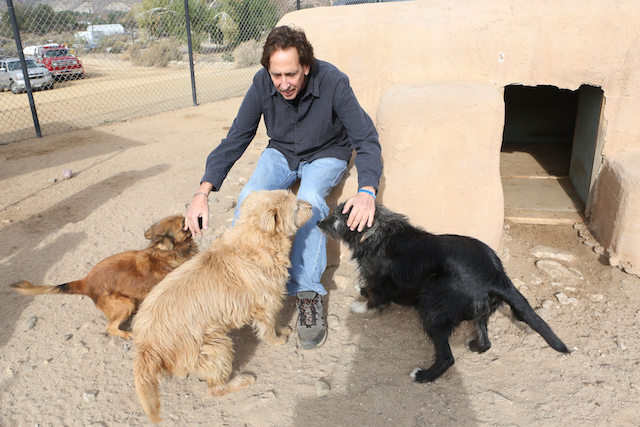
WARREN ECKSTEIN

Nationally syndicated pet expert Warren Eckstein has worked with over 40,000 animals.
As a pet therapist, Warren dispenses pet behavior and psychology advice during his call-in radio show, “The Pet Show With Warren Eckstein,” which is currently in its 31st year. He has been nicknamed “The Dr. Phil of Pets.”
DDD: One of the most interesting things I gleaned from your radio show is about allergies. We know people can be allergic to their dogs but can a dog be allergic to his or her owner?
WE: Yes, absolutely, for many reasons. Dogs can be allergic to our dander. People just assume that their dog or their cat can’t be allergic to them. Over the years I’ve gone into homes where people were unable to pick up on what the dog was allergic to. But here’s a statistic for you. Recently a veterinary dermatology clinic in Arizona tested over 100 animals, 100 different dogs. 42 out of 100 tested positive for allergies to human dander — so it’s something that we really have to take a closer look at.
So when you say human dander you mean the dog could be allergic to you but not to me?
Exactly. Everyone has different dander. Just like most people aren’t allergic to the hair of a dog, they’re allergic to the dander (with cats they’re allergic to the saliva) so yes, dogs can have no reaction to one person and then I can walk in there and they can react to me but it could be other things as well. For example, the dog could be having a reaction to the type of shampoo you use or the type of deodorant that you use or the types of drugs you may be on. For example, penicillin can cause a reaction. It could be certain foods that you’re eating that are coming out of your pores, or even the cologne that you use. There’s many many reasons why a dog or cat can react allergically to a human. But the good news is it can be coped with.
So if your dog was allergic to you then you would try to find out what it was, whether it was dander or shampoo and then change that up? Or do dogs get allergy shots if you can’t figure out what to change?
A lot of people will go to their veterinarian over and over again if their dog is having an allergic reaction and the vet could do a lot of different things. However, in the field of veterinary medicine now there are specialists just like there are in human medicine. So if I had a dog that was overreacting or had some type of allergic reaction, and I was going to my vet 3,4,5,6,7 times and the vet was putting the dog on cortisone but not really getting to the cause of it I would want to go a little bit further and maybe see a veterinary dermatologist. Now there are several ways that they can do the testing. They’d do a blood test, which will determine many different allergens. However a lot of veterinary dermatologists do prefer the under the skin testing because they get a more immediate reaction. And once they actually figure out what the dog is allergic to they’d actually make a vaccination in conjunction with pills so that a dog who was reacting in a negative way could now live a normal, happy, unallergenic life with the people they love.
My dog is one of the least food-motivated dogs around but he’s very strongly affection motivated. Most of the other dogs I come in contact with are food-motivated. Can you train a dog to be one or the other or is it just innate?
I have yet to see one dog give another dog a milkbone when they do something right. So the concept of food as a reward is something I’m not a big fan of — unless you’re doing some movie training or theatrical training, which is a whole different ballgame. But for the average person, most dogs would prefer a hug and a kiss. However, if they’re taught from day one that every time they do something right they’re going to get some kind of food reward, then you’re creating that scenario. I personally believe that there’s no need for my dog to sing three choruses of Ave Maria to get a two-cent biscuit. Plus, I get this on the air very often, many people have dogs that become very very possessive with their food. And very often the reason for that is that they’re asked to perform before they get it. It would be like if my mother said to me, “Warren, here’s this chocolate chip cookie but y’know what? You gotta sing and dance before you get it” I guarantee that when I did get that cookie no one was taking it away from me.
One of the other things you speak about on your podcasts and radio shows are dogs’ dreams. My dog seems to have a lot of nightmares. Do dogs actually dream and do you know what they could be dreaming about?
Dogs dream the same way people do. They go into these REM dreams and lots of times what they’re dreaming about is past experiences. There are many many dogs I’ve seen – and this always makes me happy – where a dog actually goes into one of those really deep REM sleeps and he has such an incredible smile on his face and his legs are moving and his tail’s moving and he’s chasing that imaginary rabbit though the middle of Ireland somewhere. But very often I’ll have a dog who is having more of a tough time with his or her dreams – they look like nightmares but they’re not really nightmares. With a dog like that, very often the dream will trace back to early abuse that may have taken place. And the best way to resolve that is to obviously awaken the dog very gradually. So they do have bad dreams and good dreams. But, generally speaking, when I have a dog with these negative dream aspects it usually traces back to abuse or some early problem that may have occurred.
I think you said that dogs have more dreams as they get older, right?
They do. And they dream more visually than we do — from every understanding that I’ve known and every person I’ve spoken to who has delved into this.
We adopted our dog when he was probably four months old and I’ve had him for 13 ½ years. And whenever I go to toss his doggy bag in a garbage can with a flip lid he freaks out. I think it’s because when he was living on the streets he was probably dropped into one. Do you think that could be the case?
Sure. My own rescue dog, Cisco, came out of a horrible hoarding situation in Acton, California with a woman who was hoarding over 200 dogs. They weren’t socialized and they’d never seen people. And what happened was the police department and animal control came in there and raided the location with sirens blasting. To this day, every time Cisco hears a siren his ears perk up and he looks around because psychologically dogs learn through association. For example, when I was studying in Europe we could take a dog back to a place where something negative happened to him and he may not remember exactly what happened but he will associate the location with something bad taking place in that specific spot.
Here’s a question people at the dog park always debate and some seem to spout out random answers… is there an ideal age to be spayed or neutered?
This issue has been controversial for many many years… almost as long as I’ve been doing this, which is well over 35 years. You’ll have some vets who are very very pro young spaying or neutering at 8,9,10,11 weeks old. Then you’ll have the vets who suggest with certain breeds, for example, Great Danes, Irish Wolfhounds, the larger breeds may want to be spayed or neutered a little bit later. So I really think that’s a discussion that each person has to have with their vet. There’s no specific answer, I think if you asked 100 vets you’d get 50 saying spay them at five or six months old and the other 50 saying wait til they are a little bit older. There have been studies that if you spay too early they develop another problem — especially female dogs — later on. But on the other side of that if you do spay or neuter your dog the bottom line is the chances of them developing testicular cancer or uterine cancer or breast cancer are well lowered so it’s kind of a decision the guardian has to make.
A lot of dogs are chewers. What are reasons that dogs chew?
Usually they’ll start chewing if they’re teething when they’re young. Or if they’re bored they’ll chew. Or if they’re not getting enough exercise they’ll chew. 80% of dogs will develop some kind or dental or periodontal disease by the time they’re 3-4 years old so that could be a reason for chewing as well. And in rare circumstances – cause most of my dogs are on pretty good food – when I was working in Europe and even when I came back here we would have dogs that would specifically chew one type of item. For example it might have been matchbooks, it might have been cigarettes, and we developed the idea that some dogs might chew because there’s something lacking in their diet.
You said one of the ways to make dogs stop chewing on objects like shoes is just to increase their mental stimulation.
Absolutely! In other words, if you don’t give the dog mental stimulation… a dog’s mouth is like a human hand and if you think about a human hand becoming bored — like right now I have a pen and I’m twirling it around in my hand – a dog doesn’t have hands so when they get a little anxious and they’re nervous or excited their mouth becomes their hands. They’re going to grab anything. Keeping them mentally stimulated, keeping them excited, is the way to go.
For example, very often people will call me and they’ll say “Warren, my dog gets really really excited when people come over and he starts to mouth on their hand and we say no, no, no, no stop it! Which is what the trainer told us to do.” But if you think about what the dog is doing, the person’s coming into your home, the dog’s excited to see them, he’s putting his mouth on them in a gentle way, not to hurt them and you’re saying “no, no, no!” that’s totally confusing. If you think about a human who goes to hug someone and that person says “no, no, no don’t hug them!” it’s the same reaction. So that’s where the basic skills come into play and it’s important to have an item so when people come in, rather than correct the dog for doing something good, you give them a special item that he only gets at that point to distract him for a few minutes until he’s over the initial excitement from someone new coming in.
You can see and hear more Warren here.





